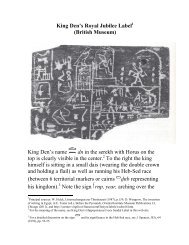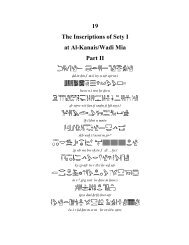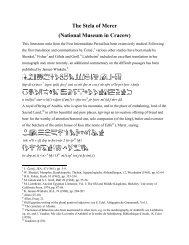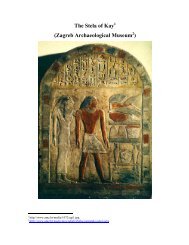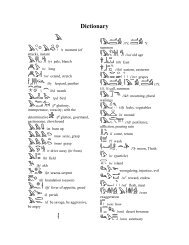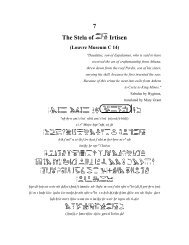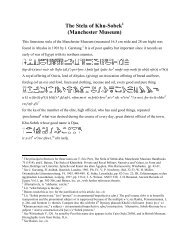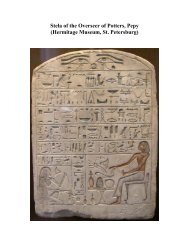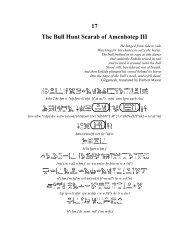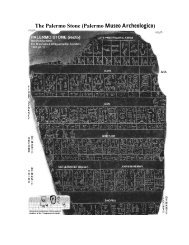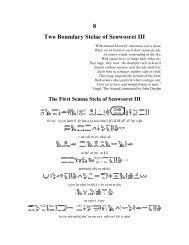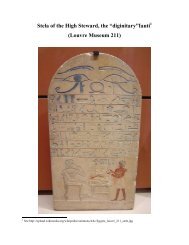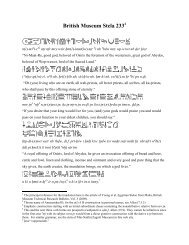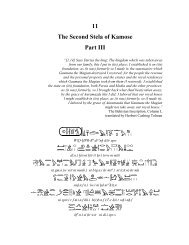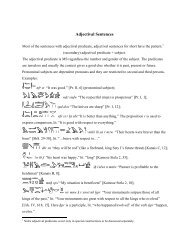6 Twin Stelae of a Well-Traveled Theban, Khetty - Middle Egyptian ...
6 Twin Stelae of a Well-Traveled Theban, Khetty - Middle Egyptian ...
6 Twin Stelae of a Well-Traveled Theban, Khetty - Middle Egyptian ...
You also want an ePaper? Increase the reach of your titles
YUMPU automatically turns print PDFs into web optimized ePapers that Google loves.
6<br />
<strong>Twin</strong> <strong>Stelae</strong> 1 <strong>of</strong> a <strong>Well</strong>-<strong>Traveled</strong> <strong>Theban</strong>, <strong>Khetty</strong><br />
“The ships lie at anchor at Barbaricum, but all their<br />
cargoes are carried up to the metropolis by the river,<br />
to the King. There are imported into this market a<br />
great deal <strong>of</strong> thin clothing, and a little spurious;<br />
figured linens, topaz, coral, storax, frankincense,<br />
vessels <strong>of</strong> glass, silver and gold plate, and a little wine.<br />
On the other hand there are exported costus, bdellium,<br />
lycium, nard, turquoise, lapis lazuli, Seric skins, cotton<br />
cloth, silk yarn, and indigo. And sailors set out thither<br />
with the Indian Etesian winds, about the, month <strong>of</strong> July,<br />
that is Epiphi: it is more dangerous then, but through these<br />
winds the voyage is more direct, and sooner completed.”<br />
The Periplus <strong>of</strong> the Erythraean Sea,<br />
translated by W.H. Sch<strong>of</strong>f<br />
Tomb 65, Stela 1<br />
Htp-di-(n)swt wsir nb Ddw xnt(i) imntiw nTr aA nb AbDw<br />
prt-xrw Ssr kAw Apdw nt rx-(n)swt mry mAa nb.f mH ib (n)swt m Spssw.f<br />
1 Lord Carnarvon’s Excavations, Cairo Museum.<br />
Hzy n.f ra r x(A)w(i) dd(i) mTAmw n nfrwt<br />
dd(i) Skrw n Hmwt mrrt (n)swt (i)m(i)-r nwDw Spsw
ip r-idr Smaw dd(i) SAbw n saHw<br />
irr(i) m xr(t) prw-kAw tp(i) r sStA(w) n pr-dwA (i)m(i)-r S(i) $ty Dd<br />
ink aqA Sw m snkt skm ns m zH n sriw<br />
irr wp(w)t m aqAt nn rwiwt.s nbt<br />
ink HD-Hr rdiw xt m iSwt nt Dt rdi.n n(.i) Hm n nb.i<br />
ni zp iry(.i) Hr n r(m)T nb m ip r-idt n pr-(n)swt<br />
r aHaw ir.n(.i) wp(w)t imAx(y) (i)m(i)-r S(i) $ty<br />
Tomb 65, Stela 2<br />
“Beyond Tabae, after four hundred stadia, there is<br />
the village <strong>of</strong> Pano. And then, after sailing four<br />
hundred stadia along a promontory, toward which<br />
place the current also draws you, there is another<br />
market-town called Opone, into which the same<br />
things are imported as those already mentioned,<br />
and in it the greatest quantity <strong>of</strong> cinnamon is produced,<br />
(the arebo and moto), ind slaves <strong>of</strong> the better sort,<br />
which are brought to Egypt in increasing numbers;<br />
and a great quantity <strong>of</strong> tortoiseshell, better than that<br />
found elsewhere.”<br />
The Periplus <strong>of</strong> the Erythraean Sea,<br />
translated by W.H. Sch<strong>of</strong>f
Htp-di-(n)swt wsir nb Ddw nTr aA nb AbDw prt-xrw Ssr kAw Apdw<br />
nt xtmt(i)-bit(i) smr-wat(i) imAx(y) (i)m(i)-r S(i) $ty Dd<br />
ink xtmt(i) nTr m sidt xAswt wn(.i) m biAw mA.n(.i) sw dbn.n(.i) xAswt Tnht<br />
wn(.i) m prw nw mHti xtm.n(.i) prw-HD.f m Dw pf<br />
n pr-Hrw-n-xtiw-mfkAt…mfkAt im m HTt nt pr-SmA<br />
wHm.n(.i) a m kt HTt HTt-nt-m… xrt r.s xprt n Hrw Ds.f<br />
Sm.k(w) m wp(w)t nt nb Hrw pn<br />
ir.n(.i) mrt.n.f ink wpt.f xtm ib.f snw n pHt ib.f<br />
ir.n(.i) n.f mrrt.f mi iryt n nTr Ds.f xsf.n(.i) n aAmw Hr xAswt.sn<br />
in snD.f rdi Sfwt(.i) idt.f rdi Hr(y)t(.i)<br />
wn xAswt ipf spr(.i) r.s Hr hy zp 2 n bAw.f<br />
mrwt.f snwH n.f tAwi nTrw Hr sxws hAw.f<br />
ii.n(.i) m Htp r aH.f in.n(.i) n.f xw xAswt<br />
m biA mA(wi) n bAwt biA psD n ihi biA rwD n mnkAw
m mfkAt Hrrwtt xsbD n tfrrt m zAhrt tpt Dww<br />
xt-aAwA m Dw n Hstiw r-nTT m bAwq-dSrt<br />
m mdww nw r-SAAwt msDmt nt khbw
<strong>Twin</strong> <strong>Stelae</strong> <strong>of</strong> a <strong>Well</strong>-<strong>Traveled</strong> <strong>Theban</strong>, <strong>Khetty</strong><br />
Vocabulary<br />
, wsir Osiris<br />
Ddw Busiris (Delta town)<br />
xnt at the head <strong>of</strong>, in front <strong>of</strong><br />
imnti western, westerner<br />
AbDw Abydos<br />
prt-xrw invocation <strong>of</strong>fering<br />
rx-(n)swt king’s acquaintance<br />
(<strong>of</strong>ficial title)<br />
, mAa true, proper, correct<br />
Hzi bless<br />
xAwi night<br />
TAm clothe, dress, veil<br />
, Xkrw, Skrw (royal) insignia,<br />
ornaments, panoply<br />
order<br />
list<br />
concerns<br />
matter<br />
Hmt woman, wife<br />
nwdw ointments, unguents<br />
ip allot, assign, count, reckon up, set in<br />
idr herd (<strong>of</strong> cattle), r-idr cattle-<br />
SAbw meals, food<br />
saH noble, dignitary<br />
xrt state, condition, affairs,<br />
sStA secret, mystery, confidential<br />
aqA precise, accurate<br />
snkt darkness, obscurity<br />
, ns tongue<br />
skm be(come) grey haired<br />
zH council, advice<br />
, sri <strong>of</strong>ficial<br />
, wpwt message, business,<br />
mission, assignment<br />
rwit interruption<br />
HD (adjective-verb) bright, white<br />
Dt estate<br />
zp happen<br />
iSt possessions, belongings<br />
xtmt(i) seal bearer/treasurer (<strong>of</strong>ficial title)<br />
bit(i) king <strong>of</strong> Lower Egypt<br />
smr wat(i) courtier lit. unique companion<br />
(<strong>of</strong>ficial title)<br />
sid make impotent<br />
biAw mining region, mine<br />
dbn go/travel around (a region)<br />
Tnht Tjenehet (unknown locality)<br />
mHti northern<br />
Dw mountain<br />
, pr-HD treasury
hillside<br />
Hrw Horus<br />
xtiw platform, dais, terraced<br />
mfkAt turquoise<br />
, Htt quarry, mine; Htwt<br />
(plural)<br />
locality)<br />
repeatedly<br />
pr-SmA Per-Shema (unknown<br />
wHm repeat; wHm a repeat; m wHm a<br />
wpwti messenger, emissary,<br />
agent, commissioner<br />
influence<br />
pH end, result<br />
xsf punish, bar<br />
Sfi respect<br />
idt dew, fragrance, censing,<br />
Hryt terror, dread, respect<br />
spr reach, attain (r arrive at)<br />
hy shout<br />
hy Hail!<br />
zp 2 ditto sign<br />
hyhy make acclamation<br />
bAw impressiveness<br />
locality)<br />
snwH impassion, inflame, marriage<br />
zxws make prosperous<br />
xw unique, exceptional, best<br />
mAwi new<br />
rwD/rwd firm, hard<br />
psD shine<br />
bAtw/bAwt Baut/Batu (unknown locality)<br />
ihi Ihi (group writing, unknown<br />
mnkAw Menkau (unknown locality)<br />
Hrrwtt Hrerutet (lit.<br />
flowery land, unknown locality)<br />
tfrrt Tefreret (unknown locality,<br />
probably near the Caspian sea)<br />
mineral)<br />
zAhrt sahret (unknown<br />
, xsbD/xsbd lapis lazuli<br />
(unknown locality)<br />
Hstiw Hesetiu (unknown locality)<br />
r-SAAwt Reshaaut<br />
bAwq-dSrt<br />
Bauk-<strong>of</strong>-the-Red-Land (unknown locality)<br />
msdmt black eye paint<br />
khbw Khabu (unknown locality)
<strong>Twin</strong> <strong>Stelae</strong> 1 <strong>of</strong> a <strong>Well</strong>-<strong>Traveled</strong> <strong>Theban</strong>, <strong>Khetty</strong><br />
Grammar Points<br />
Tomb 65, Stela 1<br />
“So great is the value that men attach to the multiplied<br />
varieties <strong>of</strong> these gems, their numerous colours, their<br />
constituent parts, and their singular beauty, that, in the<br />
case <strong>of</strong> some <strong>of</strong> them, it is looked upon as no less than<br />
sacrilege to engrave them, for signets even, the very<br />
purpose for which, in reality, they were made. Others,<br />
again, are regarded as beyond all price, and could not<br />
be valued at any known amount <strong>of</strong> human wealth; so<br />
much so that, in the case <strong>of</strong> many, it is quite sufficient<br />
to have some single gem or other before the eyes, there<br />
to behold the supreme and absolute perfection <strong>of</strong><br />
Nature's work.”<br />
Pliny the Elder, The Natural History Book XXXVII,<br />
Chapter 1, translated by John Bostock<br />
Tomb 65 <strong>of</strong> the <strong>Theban</strong> <strong>of</strong>ficial <strong>Khetty</strong> 2 was discovered during 1913-14 in Lord Carnarvon’s<br />
excavations and, according to Howard Carter, the two limestone stelae may have adorned the<br />
two sides <strong>of</strong> the entrance door. The Grammar Points here are based on the analysis in Gardiner’s<br />
article 3 containing a detailed account on the tomb. The two stelae <strong>of</strong> <strong>Khetty</strong> do not mention the<br />
ruling pharaoh but the word Mentuhotep appears twice (first in cartouche and second without) on<br />
one <strong>of</strong> the walls. Based on scanty evidence (Mentuhoteps ruled during the 11 th Dynasty and also<br />
during the 17 th and18 th Dynasties), the date <strong>of</strong> the tomb is disputed. Gardiner makes a compelling<br />
argument for possible date as the end <strong>of</strong> the 11 th Dynasty.<br />
Htp-di-(n)swt wsir nb Ddw xnt(i) imntiw nTr aA nb AbDw<br />
1 Lord Carnarvon’s Excavations, Cairo Museum.<br />
2 Howard Carter’s transcription; Gardiner transcribes this name as Akhthoy.<br />
3 JEA, 4 (1917) 28-38.
The stela starts with the usual Htp-di-nswt dedicatory formula: 4 “A royal <strong>of</strong>fering <strong>of</strong> …” The<br />
falcon on standard is an ideogram for imnt west.<br />
prt-xrw Ssr kAw Apdw nt rx-(n)swt mry mAa nb.f mH ib (n)swt m Spssw.f<br />
The typical albeit short invocation <strong>of</strong>fering is followed by the perfective relative form mry <strong>of</strong> mri<br />
“love” with nb.i “my lord” in honorific transposition: “beloved <strong>of</strong> my lord.” The perfective<br />
active participle <strong>of</strong> the 2-lit. verb mH “fill” is preceded by nswt in yet another honorific<br />
transposition. (In fact, counting in rx-nswt “king’s acquaintance” there are a total <strong>of</strong> three<br />
honorific transpositions in this passage.) The collective noun Spssw “fine things” (derived from<br />
the 3ae-gem. adjective-verb Spss “fine, noble, special”) here has a more abstract meaning<br />
reflected in Gardiner’s translation as “preciousness.”<br />
Hzy n.f ra r x(A)w(i) dd(i) mTAmw n nfrwt<br />
Hzy is a perfective passive participle <strong>of</strong> the 3-ae-inf. verb Hzi “praise, bless.” In the stela xAwi<br />
“dusk” is carved as three columns; these are replaced here by the customary xw columned<br />
hall, a variant spelling for x(A)w(i). The phrase ra r xAwi lit.“day to night” is not attested<br />
elsewhere; Gunn translates this passage as: “all day and till nightfall.” dd(i) is a clearly<br />
recognizable imperfective active participle <strong>of</strong> rdi “give.” Gardiner notes that the noun mTAm<br />
“veil” is obtained form TAm “clinging dress (to women), veil” by the so-called ‘m formation’. In<br />
fact, a few nouns <strong>of</strong> <strong>Middle</strong> <strong>Egyptian</strong> are formed by prefixing a verb with formative m (and<br />
dropping an initial weak consonant i or w if needed). Another examples are wrH<br />
“anoint” which gives mrHt “oil” and wnx “clothe (oneself)” which gives<br />
mnHt “clothing.”<br />
dd(i) Skrw n Hmwt mrrt (n)swt (i)m(i)-r nwDw Spsw<br />
4<br />
Gardiner, Excursus B, pp. 170-173, and Allen (24.10). For a recent discussion on the formula, see D. Franke, JEA,<br />
89 (2003) pp. 39-57.
The object <strong>of</strong> the participle dd(i) is Skrw, a variant writing <strong>of</strong> the noun Xkrw “ornaments,<br />
insignia.” mrrt is the feminine imperfective relative form <strong>of</strong> the 3ae-inf. verb mri “love.” In the<br />
phrase nwDw Spsw 5 “precious ointments” the determinative is usually the more suggestive oil-<br />
jar , for example: 6 .<br />
ip r-idr Smaw dd(i) SAbw n saHw<br />
In the <strong>of</strong>ficial title ip r-idr “(one) who revises the cattle list,”the 2-lit. verb ip “allot, assign” is in<br />
perfective active participle form. idr (usually with the cattle determinative and plural strokes)<br />
means “herd <strong>of</strong> cattle” and the mouth should be interpreted as “list.” As the next passage shows<br />
SAbw “meals, food” should not be taken literally as the recipients saHw are the “noble dead.”<br />
irr(i) m xr(t) prw-kAw tp(i) r sStA(w) n pr-dwA (i)m(i)-r S(i) $ty 7 Dd<br />
In the phrase iri m “act (as an <strong>of</strong>ficial)” irr(i) is the imperfective active participle <strong>of</strong> iri. This,<br />
along with xrt “affairs, concerns” (with the t ending missing) means “manage,” lit. “act in the<br />
affairs.” Note also that in the noun phrase “ka-houses” the stela has an extra row <strong>of</strong> enclosures on<br />
the top <strong>of</strong> the sign . The prepositional nisbe tpi “who is upon” along with the preposition r<br />
“concerning” has the meaning “(who is) presiding over.” The palace location pr-dwA “House <strong>of</strong><br />
Adoration” has been described by Gardiner 8 as the chamber where the king made his toilet.<br />
One needs to discuss <strong>Khetty</strong>’s title imi-r Si in detail. As Gardiner notes, the crucial sign<br />
could mean “land or water,” and the translation varies accordingly. Just what exactly were<br />
<strong>Khetty</strong>’s duties has already been detailed previously. His wide ranging functions included<br />
assisting the ladies <strong>of</strong> the royal harem to beautify themselves, controlling precious oil, revising<br />
the cattle-lists, managing the king’s wardrobe, etc. These do not help pinning down the meaning<br />
<strong>of</strong> imi-r Si, however. On the other hand, it is reasonable to assume that in this role he was<br />
entrusted by the pharaoh to organize and manage distant expeditions which involved sea as well<br />
as land travel. Gardiner chooses the nautical title “sea captain” noting that “transport-<strong>of</strong>ficer”<br />
5 See also [Urk. IV, 175, 5; 503, 11].<br />
6 [Urk. IV, 175, 5]<br />
7 Howard Carter’s transcription; Gardiner transcribes this name as Akhthoy.<br />
8 Gardiner, Notes <strong>of</strong> the Story <strong>of</strong> Sinuhe, pp. 109-110, 162.
would probably a better fit. Based on the details <strong>of</strong> <strong>Khetty</strong>’s duties provided in the second stela<br />
to be discussed next one may also choose the title: “quarry-overseer.”<br />
ink aqA Sw m snkt skm ns m zH n sriw<br />
The simple grammar (A B nominal sentence with B being aqA “straight, accurate” derived from<br />
the 3-lit. adjective verb with the same spelling and meaning) hides some subtleties in some<br />
infrequently used phrases here. A negative confession starts with the usual phrase Sw m “devoid<br />
<strong>of</strong>, free <strong>of</strong>,” (from the 3ae-inf. adjective-verb Swi) and in the following noun snkt the “sun with<br />
rays” determinative is suggestive to the meaning: “darkness” or more abstractly “obscurity.” In<br />
the next even more rare expression skm ns the first word means “grey haired” (as the hair<br />
determinative suggests). This combined with the tongue points to a “venerable, wise person.”<br />
Gardiner translates this as “hoary-tongued.”<br />
irr wp(w)t m aqAt nn rwiwt.s nbt<br />
The somewhat repetitive list goes on here detailing <strong>Khetty</strong>’s exactness. This passage first<br />
describes his work in positive terms (how <strong>Khetty</strong> performed his tasks) employing the noun wpwt<br />
“business, mission.” Then the sentence ends with an attached nn A negative construction<br />
(denying existence) employing the noun rwit “interruption” (doubtless related to the 3ae. verb<br />
rwi “cease”). The feminine suffix pronoun refers to wpwt.<br />
ink HD-Hr rdiw xt m iSwt nt Dt rdi.n n(.i) Hm n nb.i<br />
The nfr-Hr construction HD-Hr means “cheerful,” lit. “bright <strong>of</strong> face.” The participle/verbal noun 9<br />
rdiw “giver” is the first part <strong>of</strong> a direct genitive. It is clear from the context that the second part<br />
xt “thing” here means “gift.” The place where the donations are coming from is iSwt nt Dt<br />
“belongings/ possessions <strong>of</strong> the estate.” (The genitival adjective is nt in feminine plural.)<br />
Inserting the missing 1MS suffix pronoun in the dative n.i makes the attached modifier clear:<br />
rdi.n is a perfect relative form <strong>of</strong> rdi followed by the subject Hm n nb.i “majesty, my lord.”<br />
9 See the discussion at the beginning <strong>of</strong> the Grammar Points <strong>of</strong> The Instruction Addressed to Kagemni.
ni zp iry(.i) Hr n r(m)T nb<br />
m ip r-idr n pr-(n)swt r aHaw ir.n(.i) wp(w)t<br />
imAx(y) (i)m(i)-r S(i) $ty<br />
Negated indicative/perfective sDm.f : ni zp starts this passage with past meaning. The subject <strong>of</strong><br />
the verb zp “happen” is the prospective/subjunctive sDm.f <strong>of</strong> the 3ae-inf. verb iri. The prospective<br />
/subjunctive is emphasized with the double reed leaf (which is not unusual for this verb class).<br />
As Gardiner notes, iri Hr n is related to rdi m Hr n “give a command/charge to/<strong>of</strong> (someone)” so<br />
that the literal translation is: “(that) I would do a command <strong>of</strong> any people did not happen.”<br />
Another example to this construction: ni zp iry.i xt<br />
nbt Dwi r r(m)T nb. 10 The two attached adverbial phrases give further details: m ip r-idt... “as one<br />
who revises the cattle list…” followed by r aHaw ir.n.i wpwt “during the lifetime that I conducted<br />
business.” Here ir.n.i is a perfect relative form modifying aHaw. Finally, tomb biographies and<br />
stelae frequently contain the word imAxy “revered, honored.” This and the equivalent phrase nb<br />
imAx “possessor <strong>of</strong> imAx” has no English equivalent. 11<br />
10 Allen (20.5) [CG 20729 a 3].<br />
11 For a detailed discussion, see Allen, Essay 21.<br />
Tomb 65, Stela 2<br />
“Black lead is used in the form <strong>of</strong> pipes and<br />
sheets: it is extracted with great labour in Spain,<br />
and throughout all the Gallic provinces; but in<br />
Britannia it is found in the upper stratum <strong>of</strong> the<br />
earth, in such abundance, that a law has been<br />
spontaneously made, prohibiting any one from<br />
working more than a certain quantity <strong>of</strong> it. The<br />
various kinds <strong>of</strong> black lead are known by the following<br />
names the Ovetanian, the Caprariensian, and the<br />
Oleastrensian. There is no difference whatever in<br />
them, when the scoria has been carefully removed by
calcination. It is a marvellous fact, that these mines,<br />
and these only, when they have been abandoned for<br />
some time, become replenished, and are more<br />
prolific than before.”<br />
Pliny the Elder, The Natural History BookXXXIV,<br />
Chapter 49, translated by John Bostock<br />
Htp-di-(n)swt wsir nb Ddw nTr aA nb AbDw prt-xrw Ssr kAw Apdw nt xtmt(i)-bit(i) smr-wat(i) imAx(y)<br />
(i)m(i)-r S(i) $ty Dd<br />
Once again the stela starts with the usual Htp-di-nswt dedicatory formula and introduces<br />
<strong>Khetty</strong> with various titles including imi-r Si discussed previously.<br />
ink xtmt(i) nTr m sidt xAswt wn(.i) m biAw mA.n(.i) sw dbn.n(.i) xAswt Tnht<br />
<strong>Khetty</strong> asserts yet another <strong>of</strong> his titles in an A B nominal sentence. Since nTr “god” clearly refers<br />
to the pharaoh, the phrase xtmt(i) nTr can be translated as “royal seal bearer” or “treasurer.” In<br />
the m + infinitive construction the caus. 2-lit. verb sid “make impotent” is used. (For this verb<br />
class, in the infinitive the base receives a t ending.)<br />
The next passage starts with an initial adverb clause wn.i m biAw “When I was in the mining<br />
region…” with wnn being indicative/perfective sDm.f, expressing past existence. This is an<br />
emphatic construction with the perfect relative forms <strong>of</strong> the verbs mAA “see, inspect” and dbn<br />
“travel round (a region)” used nonattributively (with mAA using the usual base stem). The suffix<br />
pronoun .i is systematically absent (since it has been stated at the beginning in the form <strong>of</strong> the 1S<br />
independent pronoun ink).<br />
Gardiner points out that biAw “mining region” should refer to the Sinai peninsula and it should<br />
not have an extended view to designate a land rich in minerals. It sporadically occurs in various<br />
texts, such as the Story <strong>of</strong> the Shipwrecked Sailor, 12 and in a letter <strong>of</strong> King Neferkare (Pepi II, 6 th<br />
Dynasty) to @r-xw.f, Harkhuf :<br />
12 [ShS. 21].
13 mr Hm mAA dng pw<br />
r inw biA(w) pwnt “My majesty desires to see this pygmy more than the gifts <strong>of</strong> the mine-land<br />
and <strong>of</strong> Punt!” 14 The geographical location <strong>of</strong> Tnht “Tjenehet” is unknown and so are the ones<br />
occurring in lines 3-5.<br />
wn(.i) m prw nw mHti xtm.n(.i) prw-HD.f m Dw pf n pr-Hrw-n-xtiw-mfkAt..mfkAt im m HTt nt pr-SmA<br />
In this passage <strong>Khetty</strong> relates his deeds in Sinai. He visits prw nw mHti “the houses <strong>of</strong> the<br />
Northener” and xtm “seals up” his treasures. The grammar parallels the previous passage: wnn is<br />
indicative/perfective sDm.f and the 3-lit. verb xtm “seal, shut” is a perfect relative form used<br />
nonattributively. According to Gunn, <strong>Khetty</strong> does this to secure the turquoise here for shipment<br />
back to Egypt before he moves on to inspect another mine. According to Gardiner’s<br />
reconstruction, the name <strong>of</strong> the mountain contains the phrase xtiw-mfkAt “Turquoise-Terraces”<br />
otherwise attested in the Sinai. 15 As another examples,<br />
terraces” in Lebanon and<br />
16 xtiw nw aS “cedar<br />
17 xtiw antiw pwnt “terraces <strong>of</strong> myrrh <strong>of</strong><br />
Punt” both with the suggestive determinative . The noun Htt/HTt “mine, quarry” is well-<br />
attested in a variety <strong>of</strong> spellings and and plural . As noted above the locality<br />
pr-SmA “Per-Shema” is unknown.<br />
wHm.n(.i) a m kt HTt HTt-nt-m… xrt r.s xprt n Hrw Ds.f<br />
The circumstantial sDm.n.f /perfect continues with wHm a a synonym <strong>of</strong> the 3-lit. verb wHm<br />
“repeat.” The name <strong>of</strong> the quarry is lost but it is emphasized that it belongs to “Horus himself”<br />
(the pharaoh) using the feminine nisbe xrt along with the feminine passive participle xprt, lit.<br />
13 [Urk. I, 130, 14-15].<br />
14 Lichtheim’s translation.<br />
15 See Neferkara’s Wadi Maghara inscriptions [Urk. I, 113, 5].<br />
16 [Urk. IV, 778, 14].<br />
17 [Urk. IV, 325, 13].
“what belongs to that which has been made for...” (Note that xpr in passive voice is a synonym<br />
for iri “make.”)<br />
Sm.k(w) m wp(w)t nt nb.i pn ir.n(.i) mrt.n.f ink wp(w)t(i).f xtm ib.f snw n pHt ib.f<br />
Using simple grammar (stative followed by circumstantial sDm.n.f /perfect), <strong>Khetty</strong> now makes a<br />
general statement that he was on wpwt “mission” as wpwti “emissary” <strong>of</strong> the pharaoh. The<br />
construction ir.n.i mrt.n.f “I have done what he desired/wished” employing the feminine perfect<br />
relative form <strong>of</strong> mri is a typical statement in tomb biographies. Gardiner translates the noun<br />
phrases xtm ib.f lit. “seal <strong>of</strong> his heart” (the presence <strong>of</strong> t excludes the possibility that the cylinder<br />
seal means saH “privilege”) and snw n pHt ib.f lit. “second end <strong>of</strong> his heart” as “equal <strong>of</strong> his<br />
heart” or “counterpart <strong>of</strong> his breast,” respectively.<br />
ir.n(.i) n.f mrrt.f mi iryt n nTr Ds.f xsf.n(.i) n aAmw Hr xAswt.sn<br />
The previous construction ir.n(.i) mrt.n.f employing the perfect relative form <strong>of</strong> the verb mri<br />
“wish, love, desire” is now modified using the imperfective relative form <strong>of</strong> the same verb. The<br />
latter emphasizes the imperfect, a repeated action. The subject <strong>of</strong> the preposition mi “like” is yet<br />
another participle, the feminine passive perfective participle <strong>of</strong> the weak verb iri “do,” mi iryt lit.<br />
“like that which is done.”<br />
in snD.f rdi Sfwt(.i) idt.f rdi Hr(y)t(.i) wn xAswt ipf spr(.i) r.s<br />
Hr hy zp 2 n bAw.f<br />
A clearly recognizable participial statement starts this passage: in + the noun phrase snD.f, and<br />
the passage can be rendered as: “it was the fear <strong>of</strong> him.” The perfective active participle <strong>of</strong> the<br />
verb rdi modifies snD.f with literal meaning: “(that) which made.” The intrusive w in Sft<br />
“respect” is noted by Gardiner along with other examples. In a perfect symmetry, the particle in<br />
also governs the second clause in which (as Gardiner notes again) the feminine noun idt “dew” is<br />
used metaphorically as “influence,” translated as: “it was his influence…” The next clause has<br />
the pattern wn.f Hr sDm. Since it expresses result, the verb form <strong>of</strong> wnn is prospective/subjunctive<br />
sDm.f (with ungeminated stem wn). The subject xAswt ipf spr.i r.s contains the older form <strong>of</strong> the
PL demonstrative pronoun ipf “those,” and the perfective relative form <strong>of</strong> spr r “reach,” lit.<br />
“those countries that I reached.” In the Hr + infinitive construction, as the determinative <strong>of</strong> the<br />
word Hy also shows, the 2-lit. verb “shout, cry” is used (and not the interjection hy “hail” which<br />
18<br />
carries the determinative ). Nevertheless the scribe was also thinking <strong>of</strong> the interjection hy<br />
since he inserted the <strong>Egyptian</strong> ditto sign zp 2 indicating “hail, hail” (to his might), the shouts <strong>of</strong><br />
the people welcoming the visiting <strong>Khetty</strong>. Alternatively, the ditto sign can be interpreted as<br />
doubling: hyhy meaning “make acclamation.”<br />
mrwt.f snwH n.f tAwi nTrw Hr sxws hAw.f<br />
As Gardiner notes, the particle in from the previous passage is meant to govern mrwt.f.<br />
Accepting this, the participial statement begins as: “it is the love <strong>of</strong> him.” Gardiner mollifies the<br />
perfective active participle <strong>of</strong> the caus. 3-lit. verb snwH “impassion, inflame” (with a somewhat<br />
obscene determinative) to “marriage.” The passage ends with the syntactically adverb clause<br />
employing a Hr + infinitive construction. The clause has subject nTrw, the predicate is the caus.<br />
3-lit verb sxws “make prosperous” in infinitive, and the object is hAw.f “his time.”<br />
ii.n(.i) m Htp r aH.f in.n(.i) n.f xw xAswt<br />
Two perfect sDm.n.f forms in initial position indicate emphatic construction: “I returned…I<br />
brought. The object <strong>of</strong> the second verb is xw “unique, exceptional,” Gardiner’s “best.”<br />
m biA mA(wi) n bAwt biA psD n ihi biA rwD n mnkAw<br />
In the last part <strong>of</strong> the stela, <strong>Khetty</strong> lists the various types <strong>of</strong> metals, minerals and other precious<br />
commodities that he brought to the pharaoh. Their origins, most <strong>of</strong> which are unknown are also<br />
meticulously written down.<br />
The phonetic value <strong>of</strong> or is unclear. As the context suggests, it should mean “metal.” The<br />
generic word for “metal” (also “copper, bronze”) is biA with various spellings ,<br />
18 Gardiner (§258).<br />
, , , in which the determinatives or (for obscure
easons) are invariably present. (Actually these signs are sometimes also ideograms for<br />
“cauldron” or “copper.”) On the other hand, the nw-pot and its approximate hieratic equivalents<br />
and do appear in the words nwH “band <strong>of</strong> metal” and nws “sheet metal”<br />
which seem to point to processed metal. Due to these ambiguities, following Sethe 19 , in the text<br />
we invariably transliterate as biA.<br />
The types <strong>of</strong> metal or copper: “new, shining” and “hard” are unknown. There is only scanty clue<br />
on the whereabouts <strong>of</strong> the localities mentioned: bAwt (or bAtw) “Baut/Batu,” ihi “Ihi” 20 (the<br />
syllabic writing pointing to old location) and mnkAw “Menkau.”<br />
m mfkAt Hrrwtt xsbD n tfrrt m zAhrt tpt Dww<br />
The list continues with mfkAt “turquoise,” xsbD “lapis lazuli” and a completely unknown mineral<br />
zAhrt “sahret” (except that it is found on the top <strong>of</strong> mountains as the text states with the feminine<br />
nisbe tpt “(one) which is on the top”). Hrrwtt “Hrerutet” means “flowery land” (from Hrr<br />
“flower”) but is does not help much to identify this locality, but (lapis lazuli <strong>of</strong>) tfrrt “Tefreret”<br />
sporadically occurs in later texts with the spelling . It is conjectured to be near the<br />
Caspian Sea simply because lapis lazuli is not found anywhere nearer to Egypt.<br />
xt-aAwA m Dw n Hstiw r-nTT m bAwq-dSrt<br />
m mdww nw r-SAAwt msDmt nt khbw<br />
The rest <strong>of</strong> the precious commodities (“khet-aaua, rentjetj,” etc.) and their localities (“Hesetiu,<br />
Bauk-<strong>of</strong>-the-Red-Land, Reshaaut” and “Khebu”) are even more obscure. About the first<br />
commodity Gardiner makes the interesting comment. Assuming that in an Edfu inscription<br />
the sign was mistakenly written as then xt-aAwA is a product<br />
from Punt. The locality r-SAAwt “Reshaaut” is mentioned on a Karnak obelisk <strong>of</strong> Queen<br />
19<br />
JEA, I, 234, footnote 2.<br />
20<br />
As Gardiner (§60) pointed out, this word appears in a group writing and the correct spelling should be ihi and not<br />
ihwiw.
Hatshepsut for its turquoise quarries 21 (but not for sticks or staves):<br />
. Finally, msDmt may be a variant spelling <strong>of</strong> msdmt “black eye-paint” made from<br />
the naturally occurring metallic element antimony.<br />
21 [Urk. IV, 373, 2]



